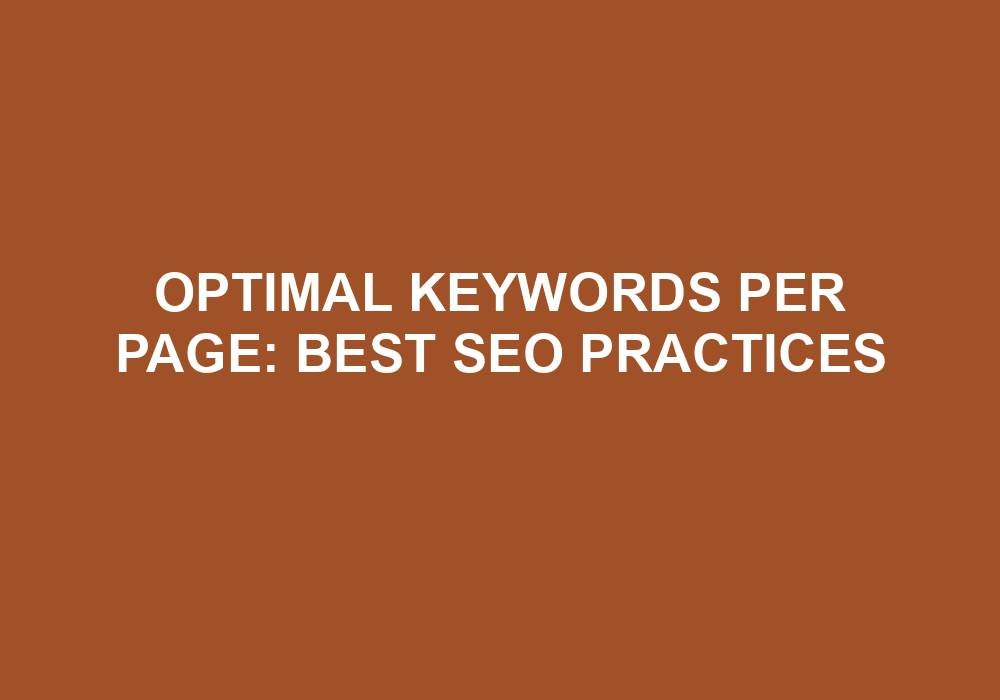Are you wondering how to optimize your website for better search engine rankings? Look no further! In this article, we’ll explore the best SEO practices for achieving optimal keyword usage per page.
If you want your website to appear on the first page of Google search results, it’s essential to understand how to effectively use keywords. By employing the right keywords in the right places, you can increase your website’s visibility and attract more organic traffic.
But what is the optimal number of keywords per page, and how can you ensure you’re using them strategically? Join us as we delve into the world of SEO and discover the best practices for optimizing your website’s keyword usage. Let’s get started!
Looking to optimize your website for search engines? Discover the best practices for optimal keyword usage on each page. By strategically incorporating relevant keywords throughout your content, you can improve your website’s SEO performance and increase organic traffic. Find out how to choose the right keywords, where to place them, and how to avoid keyword stuffing. With these SEO tips, you can enhance your website’s visibility and attract more visitors.
Optimal Keywords Per Page: Best SEO Practices
Keywords are a fundamental element of effective SEO. Choosing the right keywords and optimizing their usage on each page of your website can significantly impact your search engine rankings. In this article, we will explore the best practices for determining the optimal number of keywords per page and how to effectively use them to improve your SEO strategy.
Understanding Keyword Density
Keyword density refers to the percentage of times a keyword appears on a page relative to the total number of words on that page. While there is no exact keyword density that is ideal for all pages, it is generally recommended to keep it around 1-2%. This means that for every 100 words on a page, you should aim to include your target keyword 1-2 times.
However, it is important to strike a balance and avoid overstuffing your content with keywords. Keyword stuffing is not only frowned upon by search engines but also negatively impacts the user experience. Instead, focus on creating high-quality, valuable content that incorporates keywords naturally and seamlessly.
Furthermore, take advantage of related keywords and synonyms to diversify your keyword usage. This helps to improve the overall relevance of your content and prevents it from appearing spammy.
Optimizing Keyword Placement
While keyword density is important, it is equally crucial to optimize the placement of your keywords within your content. To maximize the SEO impact, follow these best practices:
- Include your target keyword in the page title: The page title is one of the most important on-page SEO factors. Including your main keyword in the title helps search engines understand the topic of your page.
- Incorporate keywords in headings and subheadings: Using keywords in headings and subheadings not only helps with SEO but also improves the readability of your content. Break up your content using relevant headings and ensure your keywords are strategically placed within them.
- Utilize keywords in the URL: Including keywords in the URL structure can further enhance the SEO value of your page. Keep URLs concise, descriptive, and relevant to the content.
- Optimize meta descriptions: While meta descriptions do not directly impact rankings, they are crucial for attracting users to click on your page in search results. Include your target keyword in the meta description to highlight its relevance.
- Spread keywords throughout the content: Distribute your keywords evenly throughout the content to ensure a balanced keyword presence. Avoid keyword clustering in a specific section of your content.
Quality Over Quantity
When it comes to keywords per page, quality trumps quantity. Instead of focusing on a specific number of keywords, it is more important to prioritize the overall quality and relevance of your content. Google’s algorithm has become increasingly sophisticated in understanding the context and semantics of content, so prioritizing user experience and providing valuable information should be the primary goal.
Instead of obsessing over keyword counts, consider the intent behind the search queries. Think about what the user is looking for and create content that fulfills their needs. Conduct thorough keyword research to find the most valuable and relevant keywords for your target audience and use them strategically throughout your content.
In conclusion, finding the optimal number of keywords per page involves striking a balance. Focus on incorporating keywords naturally, optimizing their placement, and creating valuable content that engages users. By following these best practices, you can enhance your SEO strategy and improve your website’s organic visibility.
The Importance of Keyword Relevancy
Relevance is a vital aspect of optimizing keywords per page. While it’s crucial to include keywords in your content, their relevance to your page’s topic is equally important. Let’s explore the significance of keyword relevancy and how it contributes to your SEO efforts.
Keyword Research: Uncovering the Right Keywords
Keyword research is the foundation of SEO and plays a crucial role in determining the optimal keywords per page. By conducting effective keyword research, you can understand the search intent of your target audience and identify the keywords that align with your content. Here are some steps to help you uncover the right keywords:
Keyword Competition: Finding the Balance
Keyword competition refers to the level of difficulty in ranking for a particular keyword. It is determined by various factors such as the number of websites targeting the same keyword, the authority of those websites, and the relevance of their content. When selecting keywords for your pages, it’s essential to strike a balance between competition and relevance. Here’s what you need to consider:
Key Takeaways: Optimal Keywords Per Page: Best SEO Practices
2. Avoid keyword stuffing to maintain a natural and reader-friendly flow.
3. Focus on using relevant keywords that align with the search intent.
4. Optimize title tags, headers, and meta descriptions with targeted keywords.
5. Regularly monitor and update keywords to stay relevant in search engine rankings.
Frequently Asked Questions
The world of SEO is ever-evolving, and understanding optimal keyword usage on a webpage is crucial for ranking high in search engine results. Check out these frequently asked questions on best SEO practices for optimal keywords per page:
1. How many keywords should I include on a webpage?
When it comes to optimal keyword usage on a webpage, it’s important to strike a balance. Instead of focusing on a specific number, prioritize creating high-quality, valuable content that meets the needs of your target audience.
While there’s no magic formula for the exact number of keywords to include, a good guideline is to naturally incorporate relevant keywords throughout your content. Avoid keyword stuffing and instead create engaging, informative content that uses keywords in a way that reads naturally to your audience.
2. Where should I place keywords on a webpage for optimal SEO?
Strategic placement of keywords on a webpage can help boost its visibility in search engine results. Start by incorporating your primary keyword in the page’s title tag, meta description, and URL. This helps search engines understand the main topic of your page.
Additionally, include keywords in the headings and subheadings of your content. This can improve the readability of your content and make it easier for search engines to identify the main points. Lastly, naturally incorporate keywords throughout the body of your content, but avoid overusing or forcing them into sentences where they don’t fit naturally.
3. Do I need to use the exact keyword phrase or can I use variations?
While it’s important to include the primary keyword of your page, you don’t have to limit yourself to using the exact keyword phrase. In fact, using variations of the keyword can be beneficial for SEO.
Search engines have become smarter and can understand synonyms and related terms. By incorporating variations of your keyword, you can create more natural-sounding content that still aligns with your target audience’s search intent. This also helps you avoid sounding repetitive and can make your content more engaging.
4. Can I target multiple keywords on a single webpage?
Absolutely! It is possible to optimize a webpage for multiple keywords, but it’s important to do so strategically. Avoid targeting too many keywords, as this can dilute the focus of your content and confuse search engines about the main topic of your page.
Instead, identify a primary keyword for each page and use variations and related terms throughout the content to indicate the topic’s breadth. This way, you can capture a wider range of search queries while maintaining a clear focus.
5. Should I focus on long-tail keywords or broad keywords?
When considering the best approach for keyword optimization, it’s wise to strike a balance between long-tail and broad keywords. Long-tail keywords are more specific and can help you target a niche audience with highly relevant search intent.
On the other hand, broad keywords have higher search volume but also higher competition. By strategically incorporating both long-tail and broad keywords into your content, you can attract a diverse range of users and improve your chances of ranking well in search engine results.
Summary
So, here’s what we learned about optimal keywords per page and SEO practices:
When it comes to keywords on a page, it’s important to use them wisely. Having a good balance of relevant keywords can help your website appear in search results. But don’t go overboard. Using too many keywords can actually hurt your SEO efforts. So, be strategic and use keywords that make sense for your content.
Remember, search engines want to provide the best results for users. So, focus on creating valuable, high-quality content that matches your audience’s interests and needs. And don’t forget to optimize your meta tags, headings, and image alt text with relevant keywords. SEO may seem complicated at first, but with the right approach, you can boost your website’s visibility and reach more people online.





